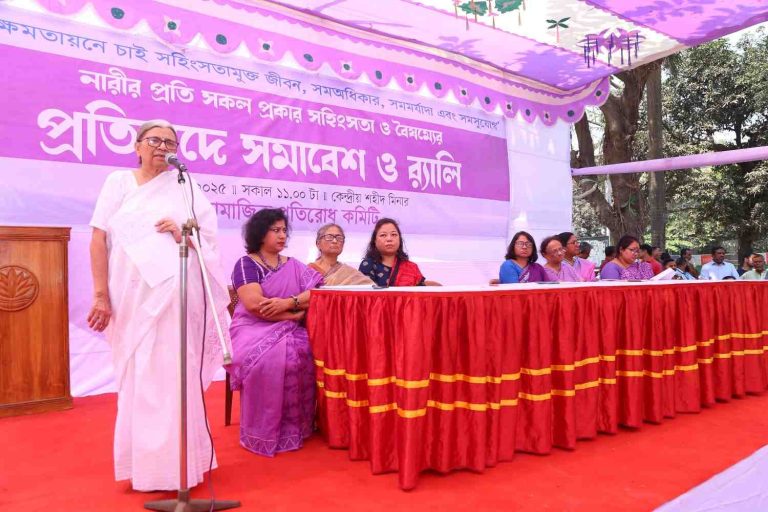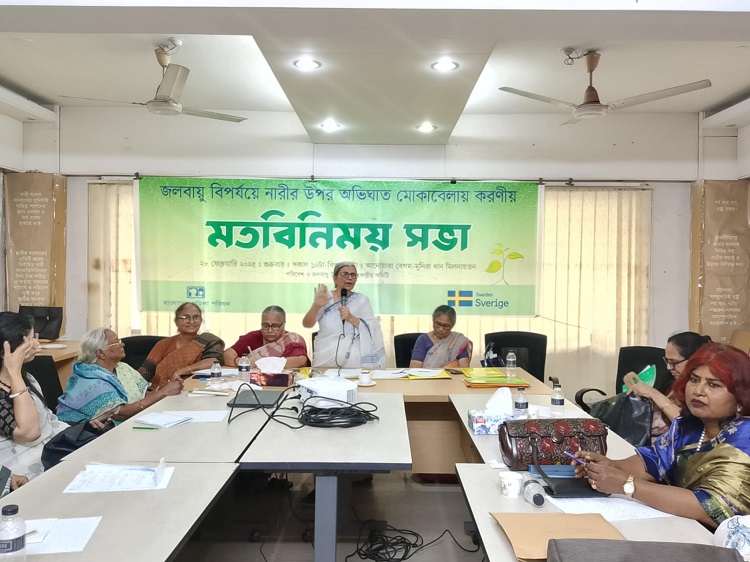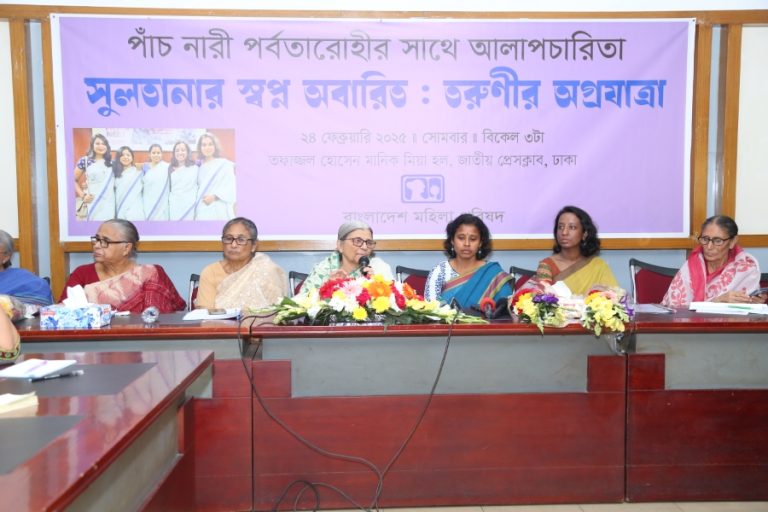On 31st May 2023, at 4 p.m. Bangladesh Mahila Parishad organized a human chain at Topkhana Road in front of the National Press Club with the demand to stop the incident of sexual harassment at Rajshahi University including all educational institutions. Dr. Fauzia Moslem, the President of Bangladesh Mahila Parishad chaired the human bond program. Maleka Banu, General Secretary of the organization, Joint General Secretary Shima Moslem, Adv. Masuda Rehana Begum, Rehana Yunus, General Secretary of Dhaka Metropolitan Committee, Rina Ahmed, Secretary of Training, Research, and Library, Dil Afroz Begum, Secretary of Finance, Rekha Saha, Secretary of Legal Aid and Juela Jebunnesa Khan, Movement Secretary of Dhaka city committee delivered their speeches.
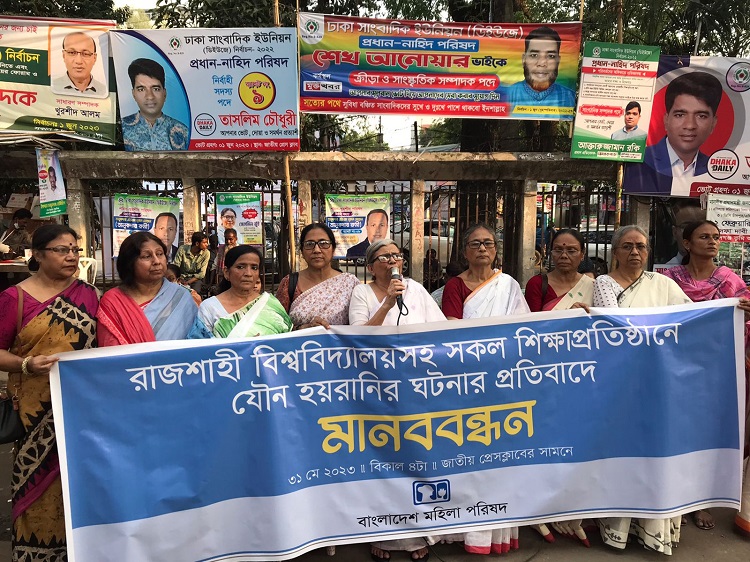
50 people including the leaders of the central committee and Dhaka city committee, editors, and journalists of print and electronic media were present in that human bond program. Adv. (In-Charge) Dipti Shikdar, Director of Legal Advocacy and Lobby of Bangladesh Mahila Parishad facilitated the program.
Dr. Fauzia Moslem said in the President’s speech that the Rajshahi University administration must take responsibility for the degradation that is seen due to the misogynist and ugly attitude of a male teacher to a female teacher of the same department in an open meeting. She questioned where are Universities known as artisans of making humans, in that case, if teachers look like that then what type of students will they make? At that time she strongly urged the teachers’ committees to stand up and prevent the incidents of sexual harassment at all universities and ensure the punishment of the culprits. Besides, she urged the mass media to reveal the reality and emphasized the Ministry of Law to play more active role in implementing the directives of the High Court to prevent sexual harassment in educational institutions and workplaces.
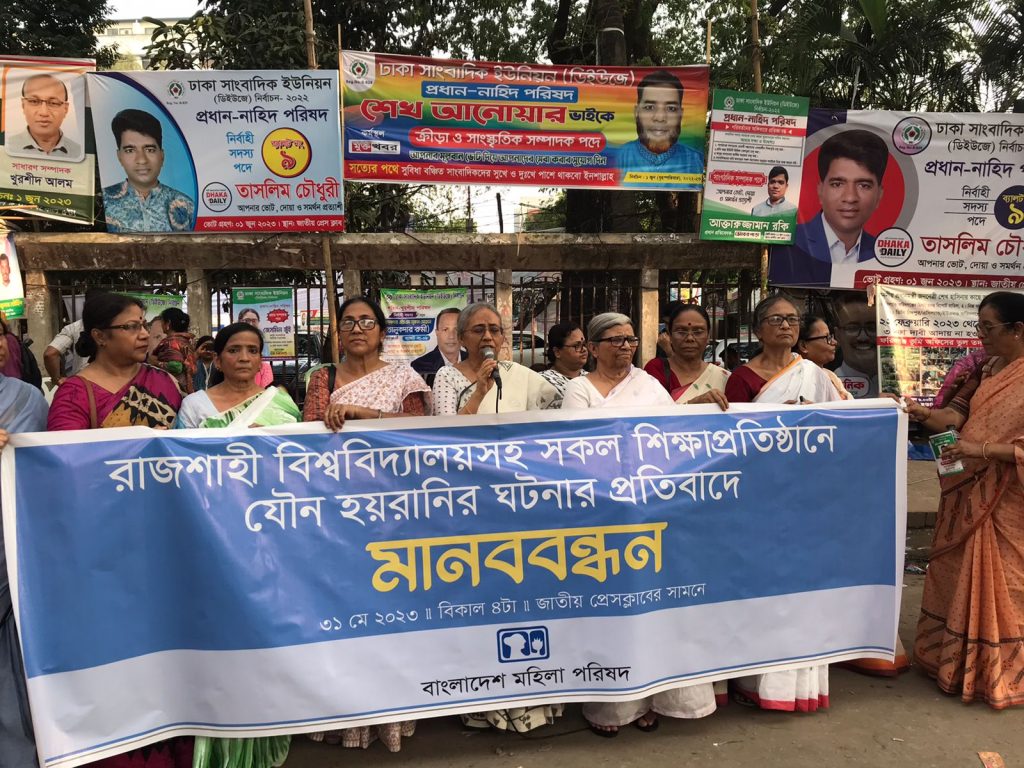
General Secretary, Maleka Banu said that in the incident of sexual harassment that recently happened at Rajshahi University, the issue of not being able to accept the demand of accountability by the accused teacher to female colleagues, at the same time the denial of women empowerment in the patriarchal structure reflects the negative attitude of the society towards the women is deeply rooted.
Other speakers said that strong steps should be taken to implement the High Court’s directives against incidents of sexual harassment in educational institutions.
Joya Sharkar of the CAMPE delivered her speech expressing solidarity with the movement against sexual harassment. Also, Action Aid Bangladesh expressed solidarity.
On 7th June 2023, at 3.30 p.m. BMP organized another program at Professor Mozaffor Ahmed Chaudhary Auditorium of the Faculty of Sociology, Dhaka University on the reflection of misogynistic attitudes: duties to prevent sexual harassment, and sexual violence at universities.
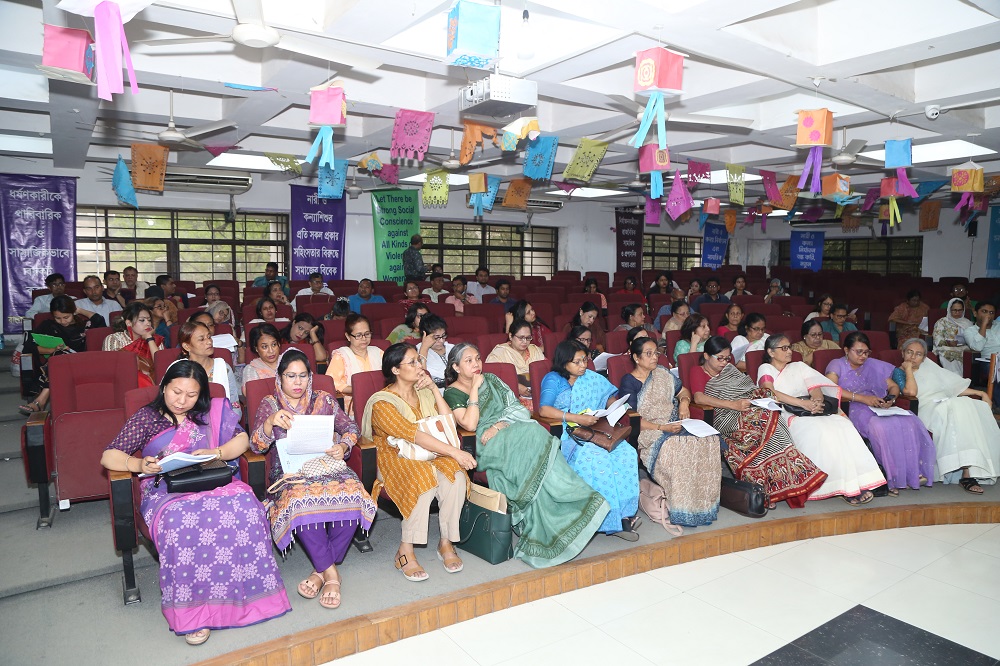
In the program, Dr. Kamal Uddin Ahmed, the honorable Chairman of the National Human Rights Commission of Bangladesh was present as chief guest. Dr. Fauzia Moslem, the President of Bangladesh Mahila Parishad chaired the program. Maleka Banu, General Secretary of the organization, gave a welcome speech. Rekha Saha, a Secretary of Legal Aid presented a written speech on behalf of the organization. Lecturers from different Universities delivered their speeches in the open discussion.
100 people including the leaders of the central committee of the organization, members of the central committee of Dhaka, among organizational members of the social prevention committee, Shakti Foundation, Campaign of Mass Literacy, YWCA, SPM-TAESP, Dhaka; Council of Women Unity, Center of Law and Justice, Awaz Foundation and journalists of print and electronic media were present on the discussion meeting. Adv. Masuda Rehana Begum, Joint General Secretary facilitated the program.
Dr. Kamal Uddin Ahmed, the honorable Chairman of the National Human Rights Commission of Bangladesh, said in the chief guest’s speech that we see the exposure to misogynistic attitudes in society. He also said that we have to be free from the culture without justice, importance should be given to establishing women’s rights, there must be a rule of law, and people at the leadership level should have accountability.
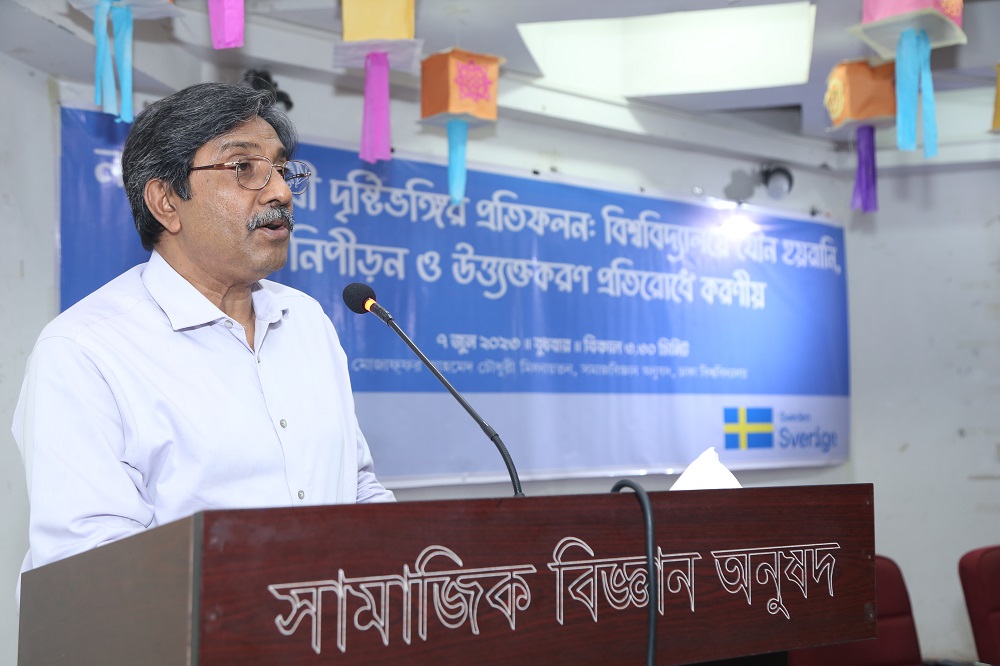
Dr. Fauzia Moslem said in the President’s speech that our work is not over when there is a complaint committee to prevent sexual harassment in educational institutions. The Organization is fulfilling its responsibility but the teachers of the educational institutions also have responsibilities. Laws alone do not solve all the problems, we have to have a law-abiding mentality, and we have to change our mentalities.
General Secretary, Maleka Banu said in the welcome speech that we need proper education to build a balanced society, and a zero-tolerance policy is needed to prevent violence.
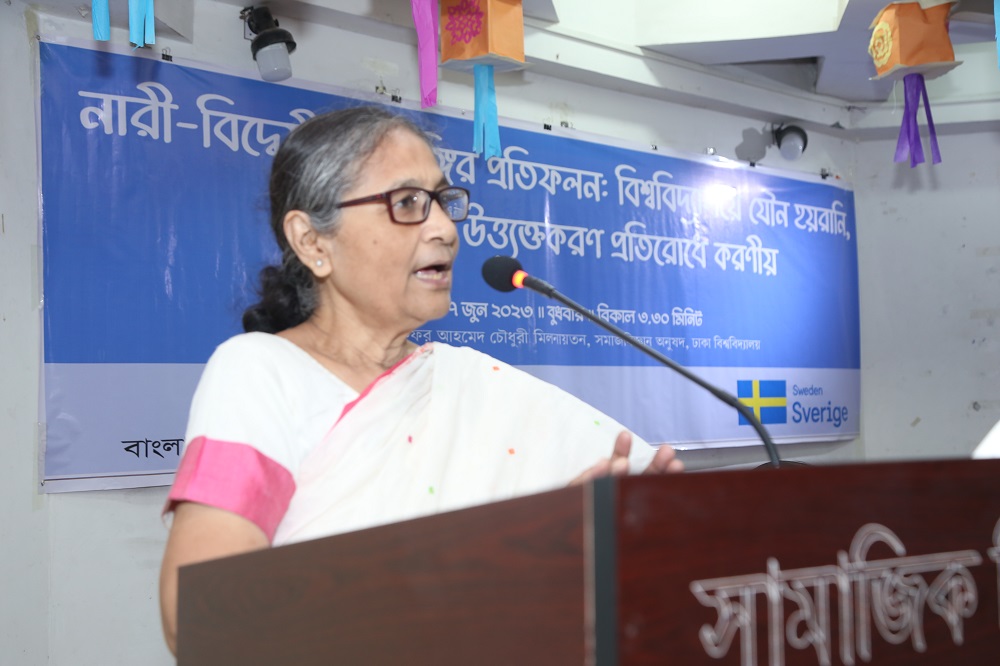
Jobaida Nasrin, Department of Anthropology, Dhaka University; Khandakar Farzana Rahman, Asst. Professor of Department of Criminology, Dhaka University; Professor Dr. Mahbuba Kaniz Keya, Chairperson of Psychology, Rajshahi University; Dr. Sadeka Halim, Head of the Department of Social Science, Dhaka University; Dr. Sharifa Sultana, Chairperson of Daffodil University; Dr. Shiuty Sabur, Asst. Professor of BRAC University; Nizam Uddin Bhuiyan, Secretary of the Teachers’ Club of Dhaka University said that the implementation of the law is a must to prevent sexual harassment. BMP believes that the union of sensible, and intelligent people is essential to establish women’s human rights, equality of men-women, and prevent all types of sexual harassment. In this case, the role of sensible teachers is important. The university including all educational institutions needs to ensure the initiatives of the Sexual Harassment Prevention Committee in light of the direction of the High Court Division and monitor the activities of this committee. Also, inclusive planning of the University authority, inclusive activities, and inclusive implementation of activities are needed to make teachers and students aware of this policy.
They also said that the incident of sexual harassment in educational institutions should not be identified as an isolated incident. There are many psychological-social-political reasons behind it. Among these reasons notable are:
1. Patriarchal mentality of thinking of women as objects.
2. Concept of male superiority.
3. Lack of proper sex education.
4. Practice of negative masculinity.
5. Lack of judgment and punishment in the cases of sexual harassment.
6. Political shelter- favor and rampant corruption.
7. Lack of organizational responsibility–accountability.
8. Lack of education on human rights, and gender equality.
There are some recommendations based on various people’s opinions. These are given below:
1. Girls-boys should be made aware of the harmful effects of eve teasing and sexual harassment.
2. Gender policies should be formulated in all universities and orientation should be given to teachers and students regarding these policies.
3. A sensitive environment should be ensured for women in all universities.
4. Women should be presented positively in mass media.
5. The subject of gender equality, human rights, and women’s rights should be included in the education curriculum aiming to make the education system gender sensitive.

